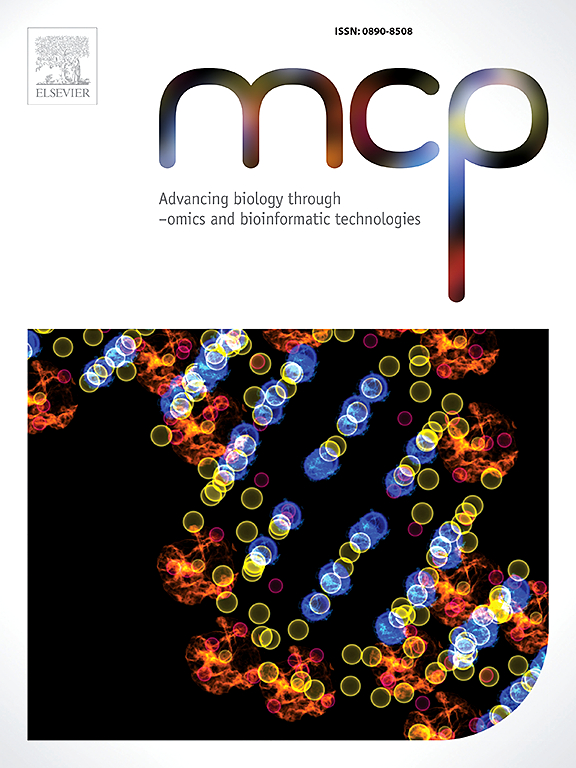High expression of ARPC1B promotes the proliferation and apoptosis of clear cell renal cell carcinoma cells, leading to a poor prognosis
IF 2.3
3区 生物学
Q3 BIOCHEMICAL RESEARCH METHODS
引用次数: 0
Abstract
Background
ARPC1B has been identified as a key regulator of malignant biological behavior in various tumors. However, its specific role in clear cell renal cell carcinoma (ccRCC) remains poorly understood. This study aims to evaluate the influence of ARPC1B on the prognosis and disease progression in ccRCC patients.
Methods
Multi-omics data and clinical information from public databases were analyzed to determine the associations between ARPC1B and prognosis, clinical features, immune microenvironment, and drug sensitivity in ccRCC. Co-expression and gene set enrichment analyses were conducted to elucidate the potential role of ARPC1B in ccRCC pathogenesis. Functional assays, including RT-qPCR, CCK8 assays, colony formation assays, immunofluorescence, immunohistochemistry, and xenograft tumor formation in nude mice, were performed to assess ARPC1B's impact on cell proliferation and apoptosis. Flow cytometry and Western blotting were further employed to investigate the underlying molecular mechanisms of ARPC1B in ccRCC.
Results
ARPC1B expression was significantly elevated in ccRCC and associated with an unfavorable prognosis. Both independent and meta-analyses confirmed that ARPC1B is an independent prognostic risk factor in ccRCC. Furthermore, ARPC1B expression significantly correlated with the immune microenvironment and drug sensitivity. In vitro, experiments demonstrated that ARPC1B knockdown suppressed ccRCC cell proliferation and induced apoptosis through the BAX-Bcl-2/c-caspase3/c-PARP axis, which was further validated by in vivo studies.
Conclusion
ARPC1B overexpression is associated with poor prognosis, altered immune status, and drug sensitivity in ccRCC. Furthermore, ARPC1B promotes the malignant behavior of ccRCC cells and holds potential as a prognostic biomarker and therapeutic target for ccRCC.
ARPC1B的高表达促进透明细胞肾细胞癌细胞的增殖和凋亡,导致预后不良。
背景:ARPC1B已被确定为多种肿瘤恶性生物学行为的关键调节因子。然而,其在透明细胞肾细胞癌(ccRCC)中的具体作用仍知之甚少。本研究旨在评估ARPC1B对ccRCC患者预后和疾病进展的影响。方法:分析多组学数据和公共数据库的临床信息,确定ARPC1B与ccRCC患者预后、临床特征、免疫微环境和药物敏感性的关系。通过共表达和基因集富集分析来阐明ARPC1B在ccRCC发病机制中的潜在作用。通过RT-qPCR、CCK8测定、集落形成测定、免疫荧光、免疫组织化学和裸鼠异种移植肿瘤形成等功能分析来评估ARPC1B对细胞增殖和凋亡的影响。通过流式细胞术和Western blotting进一步研究ARPC1B在ccRCC中的潜在分子机制。结果:ARPC1B在ccRCC中表达显著升高,且与不良预后相关。独立分析和荟萃分析均证实ARPC1B是ccRCC的独立预后危险因素。此外,ARPC1B表达与免疫微环境和药物敏感性显著相关。体外实验表明,ARPC1B敲低可通过BAX-Bcl-2/c-caspase3/c-PARP轴抑制ccRCC细胞增殖并诱导凋亡,体内实验进一步验证了这一结论。结论:ARPC1B过表达与ccRCC患者预后不良、免疫状态改变及药物敏感性相关。此外,ARPC1B促进ccRCC细胞的恶性行为,并具有作为ccRCC预后生物标志物和治疗靶点的潜力。
本文章由计算机程序翻译,如有差异,请以英文原文为准。
求助全文
约1分钟内获得全文
求助全文
来源期刊

Molecular and Cellular Probes
生物-生化研究方法
CiteScore
6.80
自引率
0.00%
发文量
52
审稿时长
16 days
期刊介绍:
MCP - Advancing biology through–omics and bioinformatic technologies wants to capture outcomes from the current revolution in molecular technologies and sciences. The journal has broadened its scope and embraces any high quality research papers, reviews and opinions in areas including, but not limited to, molecular biology, cell biology, biochemistry, immunology, physiology, epidemiology, ecology, virology, microbiology, parasitology, genetics, evolutionary biology, genomics (including metagenomics), bioinformatics, proteomics, metabolomics, glycomics, and lipidomics. Submissions with a technology-driven focus on understanding normal biological or disease processes as well as conceptual advances and paradigm shifts are particularly encouraged. The Editors welcome fundamental or applied research areas; pre-submission enquiries about advanced draft manuscripts are welcomed. Top quality research and manuscripts will be fast-tracked.
 求助内容:
求助内容: 应助结果提醒方式:
应助结果提醒方式:


